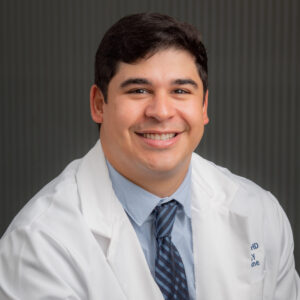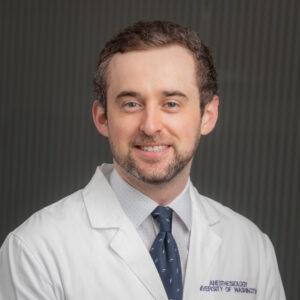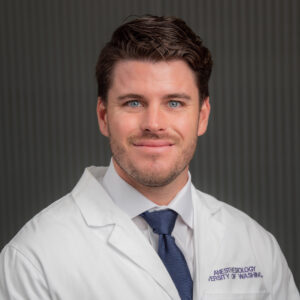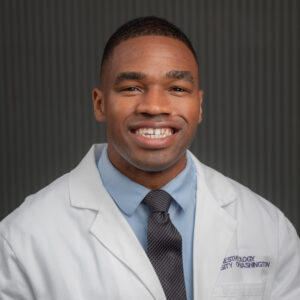Welcome to wonderful and dynamic Seattle from your UW anesthesia chief residents!
Choosing a residency program is a very exciting and momentous time. As chief residents, we want to highlight why we love the University of Washington Department of Anesthesiology & Pain Medicine!
About our training program
Residency is a time of personal and professional growth, and it is important to choose a program that is the right fit for you. We believe our combination of excellent clinical training, faculty committed to resident education, and robust didactics will provide you with everything you need to excel wherever you go after residency. Historically our graduates have been very successful at either matching into fellowship programs of their choice, or procuring jobs at academic medical centers or private groups.
Clinical training
Your anesthesiology training at UW will provide a strong clinical foundation for anything you may face coming out of residency. Our system provides specialty care for 5 states or the WWAMI region (Washington, Wyoming, Alaska, Montana and Idaho), covering almost 25% of the total US landmass. With this expansive geographic catchment region, the surgical complexity and diversity of your training experience are unparalleled. At Harborview Medical Center, a Level 1 trauma center, your experience may include everything from management of bear maulings to gunshot victims, and everything in between. At the University of Washington Medical Center, you will gain in-depth experience in the “big cases” unique to a quaternary care center including complex general surgery, oncologic surgery, cardiac surgery, transplant surgery, neurosurgery, and obstetrics. Even early on as a CA-1 you will have ample opportunities to do complex cases, such as liver transplants and craniotomies. At Seattle Children’s Hospital, a leading pediatric hospital in the country, you will experience caring for complex syndromic pediatric patients undergoing specialized surgery in addition to bread & butter cases with a diverse faculty who excel in resident education. The VA Puget Sound provides a unique opportunity to care for a vulnerable population with rotations in acute & chronic pain, pre-op clinic, regional anesthesia, and general operating rooms.
Education
Our education office and program directors have concentrated heavily on creating a robust formal didactic program at UW. Every 3 weeks on Wednesdays, each class receives a protected day away from clinical duties for problem-based learning discussions and simulation sessions. This is not including the excellent formal teaching from our subspecialty rotations. We also receive department-funded question bank subscriptions, an academic fund for textbook purchases, and unrestricted access to the huge UW Library database for scientific journals and medical texts.
Mentorship
Mentorship is critically important to success in residency. This is especially true in a large department. From days after you match, you will join your peers in the F.A.M. — the “Fantastic Anesthesia Mentorship” program! In this peer mentoring program, enthusiastic and experienced senior residents are grouped with junior residents to provide guidance during their residency journeys! Matches are made based on your specific goals and preferences to ensure a good fit. In addition to peer mentors, you will choose a formal faculty advisor at the start of your CA1 year, and will also have many opportunities to identify additional advisors and mentors based on your interests and goals.
Other opportunities
Our program rewards self-starters who can avail of the rich opportunities in the institution, hospitals, and city. As a result, there are several different pathways that residents have taken in our program. We have an excellent track record of jobs and fellowship placement, including a wide variety of fellowship opportunities at our own institution. If you are interested in pursuing research, there are extensive opportunities including a formal track through the Bonica Scholars Program. Simulation education and research is a big opportunity with multiple full-scale simulation centers at UW, Harborview, and Seattle Children’s Hospital. UW has robust multidisciplinary global health programs, and a global health leadership course is available during the CA-2 year. We have a variety of moonlighting experiences available to supplement salary if you wish, where residents are able to make extra pay for extra duty (EPED). Needless to say, if you have an interest or idea, you will find someone here who can support you with resources and guidance.
Wellness and resiliency
Resident well-being is a priority at UW. The department-funded Wellness Committee consists of an awesome group of residents from all years who organize social gatherings throughout the year. They also helped in the creation of “Wellness Rooms” at our major sites where residents share laughter and engaging conversations during breaks at work. We also have a Peer Support Program that provides a safe environment for confidential discussions to occur. It is available to all residents at any time. They assist residents with anything they need: from support following an emotionally challenging case to advice for planning fellowships and careers.
Outside of the hospital, Seattle is a culturally diverse city surrounded by beautiful water and breathtaking snow-capped mountains. The city offers an endless array of nature activities: hiking, camping, rock climbing, skiing/snowboarding, sailing, kayaking, surfing, and more. Seattle is also a rapidly growing city, with a robust culinary, coffee and micro-brew scene. We are well-known for our music, but also have a number of professional sports teams including baseball, football, soccer, and hockey! Sea-Tac is a bustling international airport offering opportunities to travel abroad during vacations, and possible 2-week vacation blocks allow international adventures.
Diversity
At UW, we are committed to recruiting a diverse group of residents. We believe that we are strongest when we have colleagues from different racial, ethnic, religious, and socioeconomic backgrounds and when we are supporting women and LGBTQ+ residents in anesthesia. Our department has its own Diversity, Equity, and Inclusion Council whose mission is to promote an inclusive and equitable working environment for the advancement of faculty, staff, and trainees. At the resident level, the recently founded Diversity Committee partners closely with program leadership to create and improve a culture of diversity and inclusion within our own training program. We have the unique opportunity to care for a diverse set of patients — both coming from across the WWAMI region, Seattle’s refugee population, and different immigrant communities locally. Diversity among physicians makes us better providers and ultimately leads to better patient care.
Resident benefits
You may have questions or concerns about UW Anesthesia given the press regarding the union negotiations. We would love to provide our Chief Resident perspective. The Resident and Fellow Physician Union – Northwest (formerly known as UWHA) is an asset to our residency. In many programs, the resident perspective may be subject to whims and changes over time. This is not the case at UW. The union provides constant advocacy of the resident perspective and allows for benefits that extend far beyond what any individual department could negotiate. Check out the benefits here from childcare to transportation to salary stipends!
Perspectives on anesthesia
Each of us has forged our own path through this program. That is the beauty of our program. Whether you are interested in pursuing academic medicine, private practice, or a non-traditional path, you will be supported in this department. Residents who are motivated, work as a team player, and thrive on opportunity will excel in our program.
Meet the chiefs
Andrew Avila

Hello everyone and thank you for taking the time to explore our program here at the University of Washington. I am the administrative site chief for both Seattle Children’s Hospital (SCH) and the VA Puget Sound Medical Center.
I grew up in a small town in California’s Central Valley, then moved to Southern California for my undergraduate and medical studies at UCLA and UCSD, respectively. My partner (who is currently a pediatrics resident at SCH) and I relocated to Seattle for residency, and we couldn’t be happier with our training and the city.
Training in anesthesiology at the University of Washington has been an exceptional experience. The diverse clinical opportunities and the wealth of knowledge shared by our faculty will prepare you to become a well-rounded and highly capable anesthesiologist. Harborview Medical Center has one of the largest catchment areas of any Level 1 Trauma Center, offering unique and complex cases. The University of Washington Medical Center provides care for some of the most medically complex anesthesia patients in the WWAMI (Washington, Wyoming, Alaska, Montana and Idaho) region. Seattle Children’s Hospital serves a wide range of pediatric patients, from healthy to highly complex, allowing you to tailor your pediatric experience to align with your specific career goals. Regardless of the career path you plan to pursue, the University of Washington offers the resources and clinical volume to help you achieve your goals while ensuring you gain a comprehensive understanding of our field.
Having lived in Southern California for a decade before residency, I can confidently say that Seattle is my favorite city to date. The city offers unparalleled access to nature, with easy access to national and state parks for day trips, as well as stunning outdoor landscapes minutes from the city. At the same time, Seattle is home to major concerts, sporting events, and all the amenities you’d expect from a large city. Whether you take the ferry to Bainbridge Island, enjoy a dinner out with friends, or explore the outdoors, there’s no shortage of activities. Seattle-Tacoma International Airport (SeaTac) is also a major international hub, offering direct flights to most North American cities and many international destinations.
In summary, the University of Washington Anesthesiology & Pain Medicine program provides an outstanding training experience, and Seattle is a wonderful place to live. If you’re considering a career in anesthesiology, I highly encourage you to consider the University of Washington.
Brett Collins

Hello future residents! I’m Brett, the academic chief resident at UW APM. I was born in Alaska and grew up in Boise, Idaho before going on to study molecular biology at Colorado State. After college I worked for a year as a college tutor before attending UW medical school. After finishing medical school, my partner and I loved UW so much we decided to couples match here.
I feel lucky every day to be a part of the UW APM family. Whether it is caring for trauma patients from the largest catchment area in the U.S. at Harborview, caring for Veterans at the VA or caring for transplant and cancer patients at UW Montlake and Seattle Children’s Hospital, I value the great diversity of clinical training sites at our institution. The only thing I hold in higher regard than our diversity of clinical sites is the amazing team of co-residents, attending physicians, CRNA’s, anesthesia techs and program coordinators I work with daily.
Having lived in Seattle through medical school and residency, I believe it is one of the most naturally beautiful cities in the U.S. If outdoor activities don’t interest you, there is still a wealth of things to enjoy within the city. In my time off I enjoy eating out, attending NFL, MLB, MLS or NHL games, going to concerts and exploring the Burke Gilman trail or one of Seattle’s many parks or beaches.
As academic chief resident I work closely with the intern class to ensure their transition from medical student to resident physician is as smooth as possible. Additionally, I partner with the administration to help with recruitment and organization of both educational and resident wellness initiatives.
We would absolutely love for you to join us in Seattle next academic year. If you have any questions about our program, please don’t hesitate to email me at brtcllns@uw.edu.
Cole Crosby

Greetings! My name is Cole Crosby and I am the administrative chief for Harborview Medical Center. I am originally from Las Vegas, Nevada. I left for a short time, moving to Portland, OR, where I did my undergraduate studies at Concordia University and also played collegiate baseball. It was during this time that I really fell in love with the Pacific Northwest. Despite this, I returned to Las Vegas for medical school at UNLV before coming back to the PNW.
I was inspired to come to UW for residency after meeting a former graduate during medical school who impressed me so much with his knowledge base and skillset. I wanted that degree of training for myself. Residency at UW has been such a pleasure and our program is entirely unique. The complexity of cases spread across all four training sites is unparalleled and the catchment area that UW medicine serves is the largest area in the nation.
Aside from this, Seattle is simply a wonderful city. There are very few US cities that can provide access to so many activities. The proximity to the water, mountains, and big city makes it truly unique. You can ski in the morning and still make it to dinner with a water view at a high-end sushi restaurant in the same day. This plus the proximity to other exciting places like wine country, Vancouver, BC, and Portland makes Seattle an extremely enjoyable place to be outside of residency.
I appreciate your interest in our program moving forward!
Obinna Ome Irondi

Hey everyone! I’m Obinna, the administrative chief resident for the University of Washington Montlake hospital. I grew up in southern California, and have decided to bounce back and forth on the coasts for my training. It was an experience of a lifetime to have a front row seat to seeing different presidents come and go in Washington, DC, while I attended undergrad and medical school at George Washington University.
UW’s training is everything that I could have asked for – that’s why I came! Diverse patient population doesn’t begin to describe it. I’m thankful for the opportunity to see a bit of everything at all levels of medical complexity; Harborview’s strong trauma and burn experiences, UWMC’s intricate cardiac + transplant + oncology + OB experiences, the VA’s variety from our veterans, and Seattle Children’s juxtaposition of healthy and medically challenging patients. Our large department also allows me to learn from a wide spectrum of approaches to care. I’m excited to become a fully trained anesthesiologist, able to handle any situation with poise after the training I receive at UW.
Seattle is a beautiful city to live in, nothing beats taking a drive through the forests that earned the city’s nickname Emerald City. Hike, run, ski, snowboard, you want it, you got it. And after you’ve spent your time outdoors, you have a food scene throughout Seattle you can refuel at.
I’m happy to be here, and hope that you can join us!